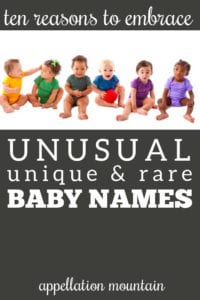
But just as surely as there are good reasons to use a common name, there’s a case for embracing unusual ones, too.
Let’s look at ten reasons unusual names are worth considering.
10. More of us have unusual names now than ever.
If you follow the statistics issued by the Social Security Administration, you might have heard this rule of thumb: less than 75% of all names given in any year are represented in the Top 1000. Dig a little deeper, and you’ll notice that the percentage seems to be inching down over time.
In 1999, over 84% of boys and nearly 73% of girls received one of the 1000 most popular names, or about 78.6% overall.
By 2008, the numbers were 79.54% of boys and 67.25% of girls. That’s 73.54% overall, 5% less than a decade earlier.
And in 2019? 77% of boys and 67.59% of girls, or 72.4% overall received a Top 1000 name.
9. Fewer of us have the most common names.
The flip side is that fewer of us receive the most common names.
Even among those children who do receive a Top 1000 name, there’s a broader distribution across those thousand choices.
Scratching your head? Here’s an example. From 1900 to 1909, more than 5.7% of all newborn boys were named John, and nearly 5.2% of all girls were named Mary.
In the 1920s, more than a quarter of all newborn boys received one of the Top Five names – Robert, John, James, William, and Charles. About 15% were Mary, Dorothy, Helen, Betty, or Margaret.
Numbers like those are unthinkable today. During the early 2000s, only Jacob, Michael, Joshua and Matthew commanded more than 1% for boys. For girls, only Emily could claim the same.
As of 2019, just Liam and Noah represented 1% or more of all births, and only Olivia crossed the 1% threshold for girls.
Or think of it this way: in 2019, the #8 name for girls, Mia, was given to 0.68% of all girls. By 1999 standards, Mia would’ve ranked #13. Go back to 1979, and a similar share of births would’ve ranked Mia just #20. As of 1959, more like #31.
8. We’re more familiar with unusual names.
Combine those two factors, and the world starts to change. It means that most of us have become accustomed to hearing more names – and more unusual names, too.
Some will consider a name like Oakleigh too trendy, or dislike the unconventional spelling of Jaxx. But do they really seem bizarre? Unthinkable?
They seem pretty normal … at least by today’s standards.
The more we become accustomed to uncommon names, the more they seem familiar – even when we hear a name for the first time.
7. All must be spelled.
We often forget that this has always been true. Kathryn or Catherine? Stephen or Steven? Plenty of long-standing names have perfectly valid variant spellings.
A few years ago, I helped out at a nursery school holiday party. We had to label their craft projects, and, of course, the parents didn’t know all of the children’s names. Instead of saying names, the head teacher spelled out C-A-Y-D-E-N and M-A-D-A-L-Y-N, occasionally pausing to make sure she had it exactly right.
If we can send Kaiden and Cayden home with the right hand-print turkey projects, then Persephone and Caspian will learn how to spell their names, too.
6. Definitions of masculine names are far broader than they were once.
The pool of girls’ names has traditionally been deeper. Some of it comes down to acceptable endings: Cecilia and Cecily and Cecile all work, as do Julia, Julie, Juliana, Juliet, Juliette, and Julianne … but there’s only Henry and Julian.
But that’s changed dramatically over the last few decades.
Names defined by longer, softer sounds, like Sebastian and Elijah, now dominate the boys’ Top 100. Of course, Maverick and Hudson are popular, too.
Whether your son’s name seems better-suited to a romantic poet or an action hero, chances are he won’t suffer for it. After all, we’re used to soulful musicians named Bruno and football stars answering to Payton.
5. Name choices tend to reflect our backgrounds and lifestyles, not dictate them.
Being named Chicago is probably not the strangest thing about being Kim Kardashian’s daughter. People would be curious about Reese Witherspoon’s youngest even if she’d named him John instead of Tennessee.
Unusual names tend to reflect the values and preferences of our households and communities. It’s easy to assume big cities with diverse populations are hotbeds of distinctive name choices – and there’s some truth to that. But New York and San Francisco don’t have a lock on inventive and inspired naming.
4. Greater acceptance of unusual names is growing.
Some argue that sticking with the classics is the best way to give your child a leg-up when she applies to Harvard. Or when he interviews for a job at the White House. Every now and again, a study pops up explaining that girls named Kate fare better than those called Bertha or Starlee.
Parents want their children to succeed, so this feels like a valid concern.
And yet, if you’re an employer eager to hire a diverse workforce or an admissions officer looking to compose an inclusive incoming class, why wouldn’t you interview Deonte along with David, Yasmeen as well as Ava?
Names like Rascal or Jezebel can seem limiting. But those represent extremes. Most parents are likely to pick names that fall somewhere more in the middle, names that won’t consistently work against their children.
And if a first name does feel a little risky? Pairing it with a rock solid classic in the middle spot can balance out even the most outrageous first name choice. Misty Rain reads a little like a stage name. But Misty Elizabeth? She has options.
3. Personalized, customized products are just a tap away.
When my kids were little, they knew brothers named Connor and Ronan. Connor had a personalized license plate for his bike. Ronan did not.
This sometimes comes up as a reason to eschew unusual names. And hey, if you were a Rhiannon shopping for back-to-school supplies circa 1993, maybe it was easy to be jealous of the personalized pencils available to Jessica, Ashley, and Sarah.
But here’s the thing: arguing that your kids will never find a personalized whatever with their unusual names suggests that you can only stick to the Top 100 – or maybe even 50 – favorites. Because those key chain racks still exist, and there’s only so much space for choices. Name your kid something even a little different – Peter, say, or Hope, and they’re out of luck.
Besides, we live in the Golden Age of custom. Almost ten years ago, I remember being relieved that I could program my daughter’s LeapFrog Puppy Pal to say her name – Clio – just as easily as it would say Emma. And that was before the Etsy app lived on my phone, with infinite customization just a few taps away.
2. Kids growing up with unusual surnames don’t seem to suffer lasting psychological harm.
I grew up with a truly unusual last name, a Polish import simplified in an attempt to make things easier in America. After I’d spelled it out, inevitably I had to explain its provenance. (“It’s Polish. My step-grandfather’s family simplified the spelling in the early 20th century …”)
When I married a man with a far simpler, mostly phonetic surname, I leapt at the chance to simplify every introduction.
But you know, I do sometimes miss my conversation-starting surname.
Both of my sisters kept it when they married – again, to men with marvelously straightforward surnames.
If there hasn’t been a widespread movement to get us all to adopt streamlined surnames like Smith and Jones, why would we expect to all answer to Henry and Emily?
1. An unusual name with meaning beats an ordinary one chosen just because.
Plenty of us give our children names without layering meaning and significance on every syllable, and that’s fine.
But when a name has meaning – when it honors a great-grandmother, or evokes the place you met your partner – even the most outlandish choice can seem like the logical, correct and inevitable option.
Did you choose unusual names for your children? Did any of these considerations give you pause?
First published on April 5, 2010, this post was revised substantially and re-published on February 3, 2021.
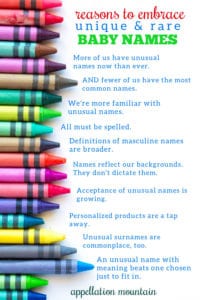
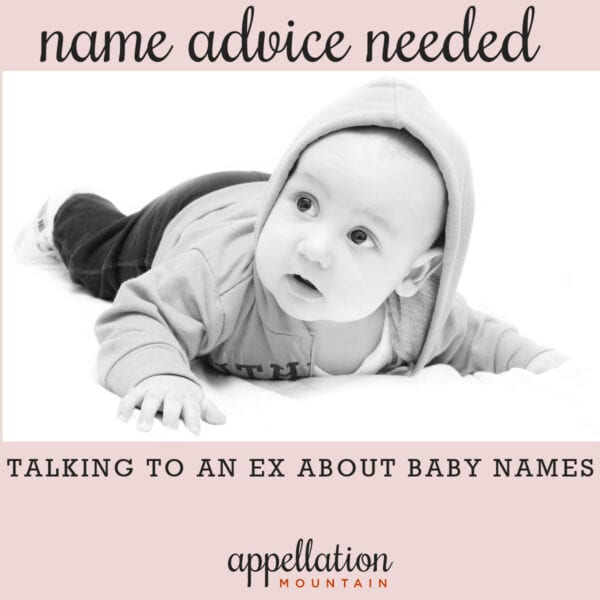
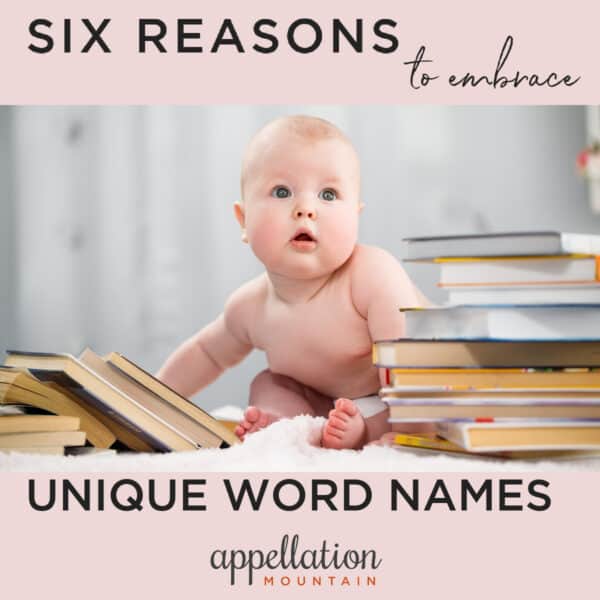
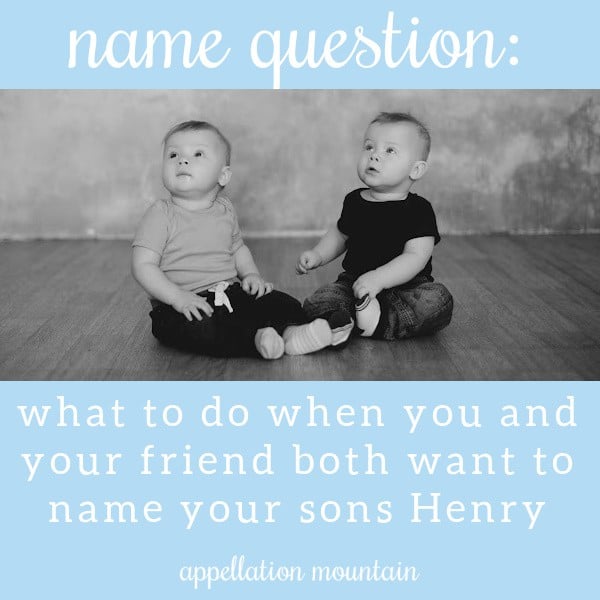
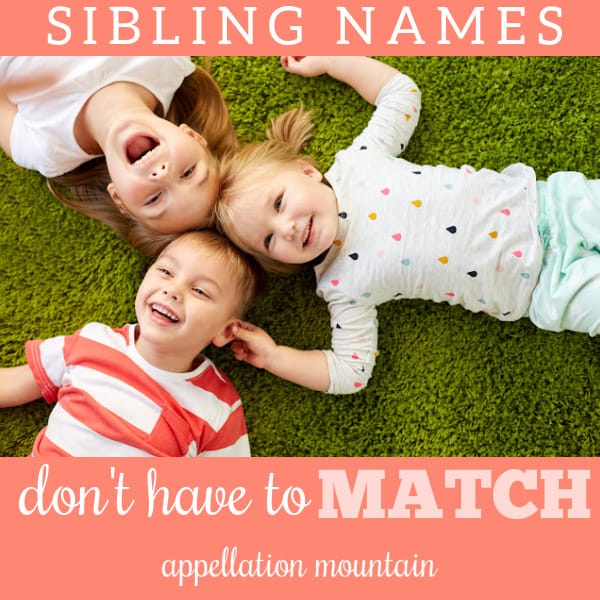
I always love reading your blog. Where were you able to find the data for the percentage of names listed in the top 1000? I only found percentages for 2010-2019 on the social security website.
Thanks, Saranel! Actually, that’s a good point – the data point isn’t listed there anymore. But I wrote the first version of this post so long ago that the data started with 1999. (In 2010, before the 2010 data was released, so 1999 would’ve been the first year presented.) I was just thinking I wish I’d captured a screenshot of every year! It would take some cutting + pasting to get the data, but it’s also possible to expand the Top 1000 names to include percent of total males/females for every year going back to 1880, and then tally that. (Go to the SSA site, select a year and then check “percent of total births.”) I’m not sure the numbers match up exactly, but they should.
About point 4, I recently found a list of people applying to be judges, and there was someone named Cinderella. I wonder if people will find it hard to associate that name with authority and the law, when all I can think of when hearing the name is children in tiaras.
I think the name puts a burden on the person to make sure the impression she gives is the opposite of the name. You can’t just give a neutral impression, because that way the name is still the most memorable thing about you, and it will be the wrong idea (because if you’re applying to be a judge, of course you have nothing to do with children in tiaras).
Iris, that’s a good point – though Cinderella is pretty extreme, right?
For a name that’s maybe a bit cute, like Cyndi – instead of Cynthia or Cindy, which seem pretty neutral to me – I think I’d still find it overcome-able. (Though, personally I’d rather be Cynthia-called-Cindy, though I’m sure I would’ve tried to be Cyndi at some point around the age of 11. I dotted with a heart, obviously.)
I wish I could actually read this…the entire body of the post reads “Last February, I posted”, and nothing else. 🙁
I will not as a rule say unusual names are a problem, I like plenty of them and there are good things that come from having an unusual name. But they can be a real burden for a child. So think about it.
I’m sure certain names can be a “burden,” but as a Lashley, I can tell you that hasn’t been the case for me. In fact, as a very shy kiddo, it gave other people a reason to start a conversation with me and I had no choice but to answer.
I wonder if a post on regional differences in unusual names would be educational/possible. Where I was born in Alabama, responses to Lashley were usually something like, “Oh, is that a family name?” (it is). When my family moved to California, then northern Virginia, and when I moved to Colorado as an adult, the questions usually presume that my parents just got kre8tiv with Ashley!
Let me think about writing about regional differences. The one catch is that, even within a region, there are still the differences of background …
I grew up with what was once an unusual name…Tess. I never even met another Tess until college. I love have a unique name. When my husband and I have a boy he will be named Breckon with the nickname Breck. We got engaged in Breckenridge, Colorado and want to honor that.
That’s a lovely way to commemorate your beginnings – and thanks for the endorsement of unusual names!
Both my husband and I are immigrants from China. We named our baby girl Mulan. It seems everybody loves that name!
I just want to chirp in here that both of my sons have ununsual names (never in the top 1000) and yesterday I got confirmation that it was the right choice for us. My son was the ONLY child on his baseball team of 20 that didn’t get called the wrong name over the course of the day. Ultimately that’s what it’s all about for me. A special name for a special child. Plus with popular names come connotations and it seems like I can come up with a negative one for most anything 🙁
Great post!
I definitely agree with #4 (“Greater acceptance of unusual names is growing”). I’m a first grade teacher (as you probably know) and we have lots of kids at our school with unusual names. The students don’t seem to find it strange at all. Sometimes I wonder if they know which names are ‘normal’ and which names are ‘different.’ If you introduce the new girl as Isabella, they’ll think it’s just SUCH a coincidence that they have a friend from church called Isabella, too. But if you introduce the new girl as Erasmia, they’ll simply say, “Hi, Erasmia,” with no acknowledgment of it being a ‘strange’ name.
I like the point you made in #3 about still being able to get personalized items online (even if you can’t find them in most souvenir shops). That was actually one of my “tests” for baby names — I specifically wanted one that was NOT on all the pens and keychains. I figured if the name I chose was on souvenirs, then I was being far too predictable.
Great post!
My girls all have unusual names (at least in the US), and I mostly feel great about that. They all (at least the ones old enough to care) love their names and get good feedback on them. We were just in England for a week for a wedding, and it was kind of a breath of fresh air to hear them introduce themselves and have people immediately repeat their names back correctly, and even say, “Oh, Pippa as in Philippa?” I must admit that I occasionally daydream of a parallel universe in which they all went by their more common, family middle names, but 95% of the time, I love the choices we made.
I also have found as we’ve considered boys’ names that I’m a bit less daring with them. Our list was still full of unusual names that would be a perfect fit with our girls’ names (Barnaby, Angus, Alistair) but I found myself pulled strongly toward simpler, more classic names like Simon and Graham that would be much higher in the charts. Maybe I think boys are still more likely to be teased for an exotic name and girls, more likely to be complimented for one? Hard to say where we would have landed had we ever had to commit to one.
Thanks for a thought-provoking post 🙂
Honestly, I think with the internet and imported television shows,movies, & international artists,the world is becoming more cosmopolitan. Also, I think things have been changing over the last few years & thing should change. I always thought that if politics, countries, people – whatever you think of change , why aren’t names also dynamic?For example, look at how a name’s gender changes to become unisex over time.I’m not saying name your kid Dirtface, but I don’t think that Persephone is that bad or is viewed as outlandish as it was say 20 years ago.By the way, I like Persephone so I’m not ragging on it 🙂
Personally, it’s not the uncommon names that I have bizarre connotations with, most of the names that I dislike or have extremely strange connotations with are the traditional,common & classic i.e Gavin.Vincent or Julian.Also, when some of the very normal names like Caley/Kayleigh etc have SO many ways to spell them, some of the spelling arguments go out the window for me.
Overall, I think people REALLY overreact about teasing.I mean, Isabella Isa-witch etc So, I think what you said was EXCELLENT & I agree with you. I really enjoyed what you wrote.